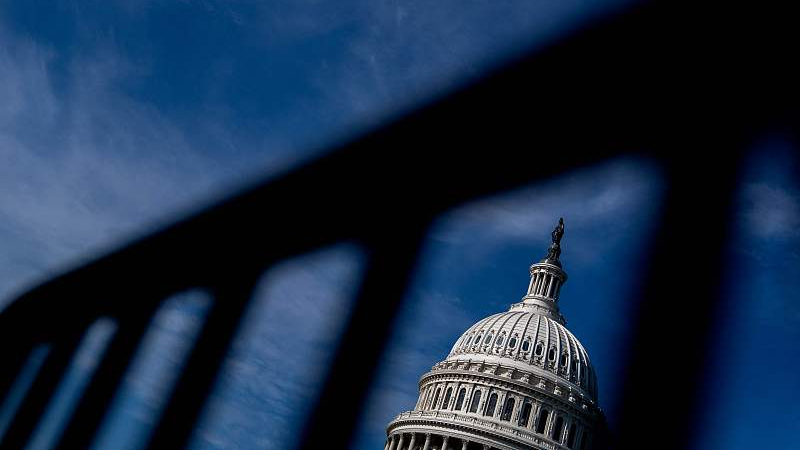Azhar Azam
Opinion 25-Aug-2022

The U.S. Capitol is seen through a police barricade in

The U.S. Capitol is seen through a police barricade in
Washington, DC, August 2, 2022. /CFP
Editor's note: Azhar Azam works in a private organization as a market and business analyst and writes about geopolitical issues and regional conflicts. The article reflects the author's opinions and not necessarily those of CGTN.
There is a sharp division between Americans, who are deeply skeptic of the U.S. overseas intervention, and the country's political parties, which believe it is the right and in the interest of the U.S. to impose its will and wield power to stoke tensions between other countries for the restoration of Pax Americana (Latin for "American Peace") or the post-1945-international order of American global dominance.
Leaders in the U.S. remained in a state of denial as ambitious regional powers such as Brazil, Turkey and Indonesia challenged the unruly U.S.-led international order and China marched toward achieving the status of a great power at an "astonishing" pace.
The U.S. is as stubborn as it has been with some lawmakers believing the country can still stop China's rise by coercing allies to rupture ties with the world's second largest economy or shifting focus from Europe to Asia.
All the notions of the right, left and center – the U.S. should shy away from Russia to take on China and vice versa or handle both without starting new or losing existing wars – are utterly misplaced. The idea will turn out to be a farce as it fails to realize the U.S.-led world order has begun to crumble not because of outside threats but due to the U.S.'s imperialist policies abroad that ignored omnipresent internal challenges: political polarization, populism and social and economic problems.
Invasions of Afghanistan and Iraq are a handful of instances of how the U.S. blew up politically, militarily and economically weak countries in the name of freedom to herd them into the American system. The so-called U.S. international campaign for human rights is just an extension of its imperialist foreign policy, which uses human rights to further its neoliberal agenda.
More recently, the U.S. has devoted its concentration on creating new hotbeds of tensions the world over. Acting as a spearhead of America's imperialism, the U.S. House Speaker Nancy Pelosi and a Congressional delegation visited China's Taiwan region. The trips, part of the global Pax Americana, signaled to reverse the 50-year old political settlement between the leaders of China and the U.S.
The provocations, designed on the Cold War pattern, risk to spark a conflict by supporting the "Taiwan independence." But such efforts cannot stop reunification of Taiwan into the Chinese mainland as China is a much stronger political, economic and military force whose stance on Taiwan is backed by more than 170 countries. The U.S., on the other hand, is on the decline and increasingly isolated for its double-standard, illegal and unilateral wars and interventionist policies on humanitarian grounds.
Since the end of the Cold War, the U.S. has been using its military power to assert its world hegemony. It destabilized vast swathes of the Middle East and North Africa as well as South and Central Asia by frequent invasions, eventually abruptly ending its military campaigns and leaving the regions with tails in legs.
Deluded by the Cold War nostalgia, the U.S. President Joe Biden spun the Ukraine conflict into a battle of democracy versus autocracy and incited China through serial interferences in the Taiwan region. His promotion of democracy and "freedom" is another shot to revive the era of Pax Americana. Yet global publics don't condone this offensive posture concocting an imaginary threat to democracy from "autocracy," warning economic inequality is the biggest challenge for the survival of the Western form of governance.
Editor's note: Azhar Azam works in a private organization as a market and business analyst and writes about geopolitical issues and regional conflicts. The article reflects the author's opinions and not necessarily those of CGTN.
There is a sharp division between Americans, who are deeply skeptic of the U.S. overseas intervention, and the country's political parties, which believe it is the right and in the interest of the U.S. to impose its will and wield power to stoke tensions between other countries for the restoration of Pax Americana (Latin for "American Peace") or the post-1945-international order of American global dominance.
Leaders in the U.S. remained in a state of denial as ambitious regional powers such as Brazil, Turkey and Indonesia challenged the unruly U.S.-led international order and China marched toward achieving the status of a great power at an "astonishing" pace.
The U.S. is as stubborn as it has been with some lawmakers believing the country can still stop China's rise by coercing allies to rupture ties with the world's second largest economy or shifting focus from Europe to Asia.
All the notions of the right, left and center – the U.S. should shy away from Russia to take on China and vice versa or handle both without starting new or losing existing wars – are utterly misplaced. The idea will turn out to be a farce as it fails to realize the U.S.-led world order has begun to crumble not because of outside threats but due to the U.S.'s imperialist policies abroad that ignored omnipresent internal challenges: political polarization, populism and social and economic problems.
Invasions of Afghanistan and Iraq are a handful of instances of how the U.S. blew up politically, militarily and economically weak countries in the name of freedom to herd them into the American system. The so-called U.S. international campaign for human rights is just an extension of its imperialist foreign policy, which uses human rights to further its neoliberal agenda.
More recently, the U.S. has devoted its concentration on creating new hotbeds of tensions the world over. Acting as a spearhead of America's imperialism, the U.S. House Speaker Nancy Pelosi and a Congressional delegation visited China's Taiwan region. The trips, part of the global Pax Americana, signaled to reverse the 50-year old political settlement between the leaders of China and the U.S.
The provocations, designed on the Cold War pattern, risk to spark a conflict by supporting the "Taiwan independence." But such efforts cannot stop reunification of Taiwan into the Chinese mainland as China is a much stronger political, economic and military force whose stance on Taiwan is backed by more than 170 countries. The U.S., on the other hand, is on the decline and increasingly isolated for its double-standard, illegal and unilateral wars and interventionist policies on humanitarian grounds.
Since the end of the Cold War, the U.S. has been using its military power to assert its world hegemony. It destabilized vast swathes of the Middle East and North Africa as well as South and Central Asia by frequent invasions, eventually abruptly ending its military campaigns and leaving the regions with tails in legs.
Deluded by the Cold War nostalgia, the U.S. President Joe Biden spun the Ukraine conflict into a battle of democracy versus autocracy and incited China through serial interferences in the Taiwan region. His promotion of democracy and "freedom" is another shot to revive the era of Pax Americana. Yet global publics don't condone this offensive posture concocting an imaginary threat to democracy from "autocracy," warning economic inequality is the biggest challenge for the survival of the Western form of governance.

U.S. President Joe Biden visits the Lockheed Martin's Pike County Operations facility, where Javelin anti-tank missiles are manufactured, in Troy, Alabama, May 3, 2022. /CFP
The hawkish U.S. mindset is encountering a strong resistance from several emerging countries across the continents where majorities don't want to cut ties with Russia on the Ukraine conflict. Given a large global support for China's view on the Taiwan region and Washington's implicit recognition of China's sovereignty over Taiwan, the U.S. Cold War mentality including forging military alliances like the Quad and the AUKUS and democratic bloc will not triumph.
Over the years, the U.S.-led international order has produced a "huge, unmanageable financial bubble" and deep inequalities and encroached on nations' territorial integrity. China doesn't need to "reshape" the system; America's own policies are leading the way for a more balanced, multipolar and symmetrical global order based on respect of national sovereignty and shared interests.
The trend is gathering momentum as regional economic powers, unwanted by the U.S.-led blocs, are considering joining inclusive regional and global organizations such as BRICS or Shanghai Cooperation Organization.
Pax Americana is becoming even more elusive for it didn't adhere to international law and undermined peace and stability and multilateralism. As a result, the world is witnessing end of the unipolar and emergence of a multipolar order. The U.S. pursuit of hegemonizing the world and efforts to inflict its self-styled rule is solely responsible for the country's decline and potential sudden collapse.
In the age marked with intense global challenges of the 21st century and mutual interdependence, the 20th century strategy to contain China and reestablish a unipolar world order is inoperable and fatally flawed.
Today, not many countries will be tricked by Pax Americana, veiled in Washington's illusory campaign for democracy. Biden needs to understand changing global attitudes, emphasize internal weaknesses and review his aggressive policies to avert the looming American decline.
(If you want to contribute and have specific expertise, please contact us at opinions@cgtn.com. Follow @thouse_opinions on Twitter to discover the latest commentaries in the CGTN Opinion Section.)
No comments:
Post a Comment